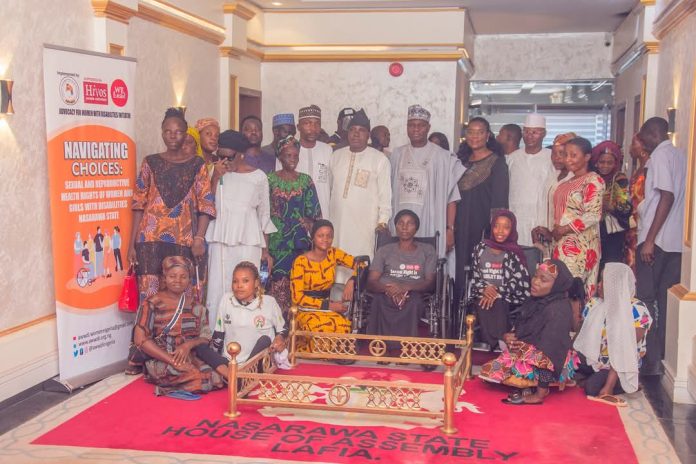In a significant step towards advancing the rights of Women and Girls with Disabilities (WGWDs), the Advocacy for Women with Disabilities Initiative (AWWDI) held a landmark engagement with the Nasarawa State House of Assembly on November 14, 2024. The event, which was part of the Hivos WeLead Project, sought to address critical issues surrounding the Sexual and Reproductive Health Rights (SRHR) of WGWDs, amplifying their voices and advocating for policies that promote inclusivity and accessibility.
A Gathering of Changemakers
The meeting, held within the chambers of the Nasarawa State Assembly, brought together key stakeholders committed to driving change. Among those present were the Honourable Speaker of the Nasarawa State House of Assembly, members of the legislature, representatives from Organizations of Persons with Disabilities (OPDs), and advocates from AWWDI.
In his opening address, AWWDI’s Program Manager, Mr. Kolawole Jayeoba, set the tone for the discussion by highlighting the unique challenges faced by WGWDs in accessing their SRHR.
“Women and Girls with Disabilities continue to face systemic barriers that limit their access to vital SRHR services,” Jayeoba said. “From inaccessible public structures to marginalization in health policies and service delivery, the hurdles they face are many. Today, we are here to seek your support in addressing these barriers.”
The Challenges at Hand
Mr. Jayeoba outlined two critical challenges that WGWDs in Nasarawa State face:
- Limited Accessibility to Public Structures: Many public buildings, including healthcare facilities, remain inaccessible to persons with disabilities, creating physical barriers to SRHR services.
- Marginalization in SRHR Services: WGWDs are often excluded from SRHR-related discussions and policies, leading to inadequate service delivery tailored to their needs.
He emphasized that these challenges are not just issues of physical access but also a matter of human rights.
“Every woman and girl, regardless of ability, deserves equal access to healthcare, education, and opportunities that allow them to thrive,” Jayeoba stressed.
Commitment from the Legislature
The engagement received a positive response from the Honourable Speaker and other members of the Assembly, particularly the Vice Chairman of the House Committee on Women Affairs. The Speaker acknowledged the importance of the issues raised and pledged the Assembly’s commitment to fostering inclusivity and accessibility for persons with disabilities.
“We are fully committed to ensuring that no one is left behind in Nasarawa State,” the Speaker said. “The challenges brought to our attention today are not just the concerns of WGWDs but a call to action for us as lawmakers to build an inclusive society.”
Key Outcomes
The engagement yielded several notable outcomes that signal progress toward achieving AWWDI’s advocacy goals:
- Commitment to Accessibility Improvements: The Nasarawa State House of Assembly pledged to prioritize accessibility in public structures, ensuring that facilities are inclusive and accessible to all.
- Strengthened Collaboration: AWWDI and the State Assembly agreed to work closely together, particularly in drafting and implementing policies that address the unique needs of WGWDs.
- Legislative Support for Inclusive Policies: The Assembly promised to provide legislative backing for policies that promote the SRHR of WGWDs, ensuring their inclusion in state development plans.
A Future of Hope and Inclusion
The engagement at the Nasarawa State Assembly is a testament to AWWDI’s commitment to ensuring that WGWDs are not sidelined in discussions about their rights and well-being. The organization’s advocacy is a critical step toward creating a society where every woman and girl with a disability has equal access to healthcare and opportunities.
As the meeting concluded, Mr. Jayeoba expressed gratitude to the Honourable Speaker and members of the Assembly for their willingness to listen and take action.
“This is just the beginning,” he said. “We are confident that with your support, we can break down the barriers that hinder WGWDs from accessing their rights and build a future that is truly inclusive.”
The event underscores the power of collaboration between civil society organizations and government institutions in driving social change. With promises of accessibility improvements, strengthened partnerships, and legislative support, Nasarawa State is poised to become a model for inclusivity and disability rights in Nigeria.
For WGWDs in the state, the future holds the promise of equality, dignity, and the full realization of their rights.


